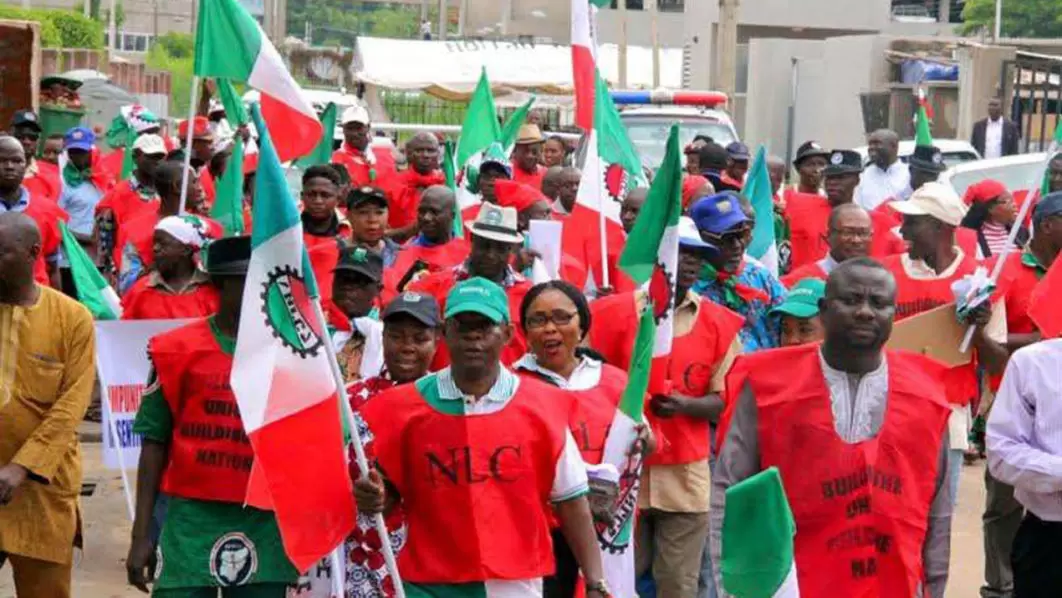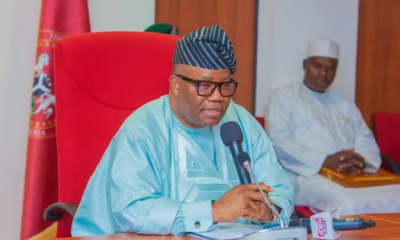Comments and Issues
Labour warms to new cash awards, others replacing N8,000 ‘insultive’ palliative
Published
9 months agoon

Members of rganised labour have reportedly applauded a plethora of “Palliatives” rolled out on July 20 by the National Economic Council (NEC) – statutorily chaired by Vice President Kashim Shettima.
They include: Immediate release of grains and fertilisers by the Federal Government to states, for distribution or sale at subsidised prices; conditional cash transfers to the poorest of the poor; a cash award policy to aid civil servants for six months; and a new minimum wage for workers.
Others are: Payment of (arrears) of salaries, allowances, pensions, gratuities; support for Micro, Small and Medium Enterprises (MSMEs); and start of energy transition from petrol to Compressed Natural Gas (CNG) for vehicles, and eventual use of e-Vehicles in the long run.
State governments will generate comprehensive registers “for the vulnerable people only,” and drive the new “awards” that replace the panned President Bola Tinubu’s “N8,000 monthly palliative to 12m poor and vulnerable households.”
Tinubu had instituted the N8,000 palliative without recourse to a Presidential Technical Committee set up to work out modalities for alleviating subsidy removal from essential products and services.
Nigerians – including Tinubu’s supporters aliased ‘BATists’ and ‘Progressives’ – who’d questioned the rationale for the “N8,000 monthly “tokenism” and called for its reversal, would rather go with the President than do something to rock the boat of the nation.
But not so with organised labour, which read in the N8,000 relief package a design by Tinubu to relegate their demands, headlined by a review of the minimum wage by 100% to 200%.
It’s an opportunity for the unions to flex muscles, threatening to resume their strike – suspended in June due to criticisms, and a court restraining order.
President Tinubu’s claim of “fuel subsidy is gone” in his inaugural speech on May 29 – and floating of the Naira – had caused hoarding and scarcity of petrol, and a 300% jump in pump price.
The effect is the prevailing rise in the prices of goods and services, and even acute shortage of common commodities, such as tomatoes, in southern Nigeria.
With the carte put before the horse, the Tinubu government had mooted a variety of palliatives, and constituted a Technical Committee to work out the modalities.
Yet, with mounting pressure, the government moved a pace – without the committee’s report – and announced an N8,000 monthly stipend – for six months – for 12m poor and vulnerable households.
The allowance and other remedial measures would be financed with N500bn from the supplementary budget prepared by President Buhari’s government; and $800m (N600bn) World Bank loan to mitigate effects of fuel subsidy removal.
The President’s letter in that regard to the National Assembly states in part: “Please note that the federal executive council, led by President Muhammadu Buhari, approved an additional loan facility to the tune of $800 million to be secured from the World Bank for the National Social Safety Net programme, Copy of FEC’s extract attached.
“You may also wish to note that the purpose of the facility is to expand coverage of shock responsive safety net support among the poor and vulnerable Nigerians.
This will assist them in coping with basic needs.
“You may further wish to note that under the conditional cash transfer window of the programme, the Federal Government of Nigeria will transfer the sum of N8,000 per month to 12 million poor and low income households for a period of six months, with a multiplier effect on about 60 million individuals.”
“In order to guarantee the credibility of the process, digital transfers will be made directly to beneficiaries’ accounts and mobile wallets.
“It is expected that the programme will stimulate economic activities in the informal sector, and improve nutrition, health, education, and human capital development of beneficiaries’ households.”
Rather than applause for moves to redeem its pledge to relieve the hardship borne by mostly the less-privileged in the society, the Tinubu government came under hammer for the miserly N8,000 award that can’t take the estimated five per household (60m) through a week.
There’s a torrent of questions from concerned Nigerians, with the organised labour leading the charge. A sampler:
- How did the government arrive at N8,000 monthly stipend for six months. * What’s the credibility of the data relied on to compile the beneficiaries. * Where and when was the data collected, and by who * What’s 12m households in over 133m Nigerians below the poverty line. * Who provides for the millions outside the scheme?
- Will government scale-up or reduce the beneficiaries, or abandon the process after six months.
- Will suffering in the land vanish after six months, to stop the social safety net. * What happens to the policy if there’s a change of government within the timeframe of implementation?
Summing up, labour leaders – irked by Tinubu’s alleged “bad faith,” and loss of credibility in the technical committee that he’d empanelled to work out modalities to alleviate the subsidy removal – gave their damning verdict, as captured below:
As reported by Vanguard on July 14, an official of the Nigeria Labour Congress (NLC), who spoke on the issue, says: “The action of the President has actually undermined the credibility of his own Committee.
“We believe it is not only undemocratic but shows that the President is merely setting up the committee as a window dressing for whatever purposes he has set out for himself.”
The President, Trade Union Congress of Nigeria (TUC) and Petroleum and Natural Gas Senior Staff Association of Nigeria (PENGASSAN), Festus Osifo, holds that,
“Any palliative payment must be in line with the agreement reached with labour (and) in line with the technical committee meeting.”
To Dr Tommy Okon, president, Association of Senior Civil Servants of Nigeria (ASCSN) and deputy president of TUC, “What form of poverty alleviation policy implementation strategy is this?”
“Is it not proper to allow the Presidential Committee to conclude its assignment and arrive at a collective agreement with organized labour before embarking on any palliative care distributions?
“It’s an economic waste. What is N8,000 monthly to 12 million Nigerian households with this hyperinflation and socio-economic challenges?” Okon queries.
“What the government is doing could amount to exactly what the previous (Buhari) administration did that yielded no positive impact on the economy and the citizens.”
“The President has been ill-advised, as that amount (N8,000) cannot feed a child in one month, talk less a family… It’s an insult on Nigerians,” says Ms Jean Anishere Chiazor, vice president, Maritime Arbitrators Association of Nigeria (MAAN).
And the General Secretary of the Non-Academic Staff Union of Educational and Associated Institutions (NASU), Prince Peters Adeyemi, warns:
“We need to know the criteria to be used in determining those that will benefit from the programme. We hope this will not be another avenue for a few individuals to divert such money to their private pockets.”
Tinubu’s reversal of the N8,000 award barely a week later is allegedly traced to rumbles in the unions worried that he’d ditched their demands, chiefly a hike of at least 100% in minimum wage.
To pre-empt the unions’ moves to resume their suspended strike, Tinubu came out as a “listening President,” to rollback the N8,000 palliative, and promise release of thousands of farming inputs, and a speedy review of the minimum wage.
Labour’s still “lukewarm” to the President’s latter pledges, but the National Economic Council’s resolutions have “warm the unions’ hearts,” as payment of “cash award, outstanding salaries, allowances, pensions and gratuities, and a minimum wage” top the items to be implemented.
As a labour leader remarked at the weekend, “If the three tiers of government implement these palliatives, the average and poor Nigerians will at least breathe under the crushing effects of subsidy removal from petrol.
“We commend the Federal and State governments, through the National Economic Council, for these bold moves, and hope they will not disappoint Nigerians.”
Governors Dapo Abiodun (Ogun), Chukwuma Soludo (Anambra) and Bala Mohammed (Bauchi) – who spoke with reporters after the NEC meeting at the Presidential Villa in Abuja – said the government would implement the resolutions, and timeously, too. Nigerians hope so!
Mr Ezomon, Journalist and Media Consultant, writes from Lagos, Nigeria .
Twitter: @EhichioyaEzomon
Trending

 Inspirational1 week ago
Inspirational1 week agoPastor Chris Oyakhilome: A Healing Minister Dedicated to Enhancing Public Health

 Featured6 days ago
Featured6 days agoGov, Abiodun appoints Chess master, Onakoya sports ambassador

 Crime6 days ago
Crime6 days agoVandalism: Osun water corporation appeals to residents

 Featured6 days ago
Featured6 days agoOsun PDP chieftain, Abbas resigned from party

 Business5 days ago
Business5 days agoZenith Bank shareholders approve Holdco structure

 Editorial3 days ago
Editorial3 days agoGovernor Obaseki Increases Minimum Wage to N70,000 in Edo State

 Business2 days ago
Business2 days agoNNPC says fuel queues to be cleared by Wednesday

 Featured2 days ago
Featured2 days agoNigeria confronted with multifaceted challenges – Akpabio

